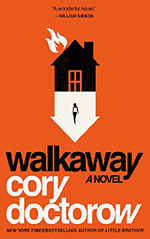
![]() charlesdee
charlesdee
7/30/2017
![]()
I recommend Doctorow's novel for readers suffering from Post Apocalyptic Fatigue Sydrome. The one hard date mentioned in the text is 2071, and Doctorow's near future embodies most of the worst possibilities of the way things are going now. The super rich, known as zottas, run a show that continues to exploit earth's dwindling resources and leaves the teeming masses scrambling to make do in increasingly dire circumstances. Which they do, unless they decide to "walkaway" and join the increasing number of those living in the wide swaths of the American landscape that has been abandoned as populations cluster in more concentrated areas where resources are parceled out by the ruling class and a few jobs remain. By focusing on the walkaways, Doctorow keeps the dystopian tropes in the background and writes a story of the hard work that goes into building a new kind of society. The exponential growth of technological innovation means that the walkaways are creating living situations far removed from any past "back-to-nature" scenarios. One group of walkaway scientists has, in fact, conquered death--at least to the extent that an individual's scanned mind can exist in the digital realm. This development, predictably of great interest to the ruling class, propels much of the plot.
Utopian novels usually involve a lot of explaining, and while Walkaway is not the kind of guided tour that has plagued the genre from Thomas More to the present day, there is a lot of talk. One character comments that walkaways are prone to discussing every possible angle of every decision, and readers will find themselves on the receiving end of those discussions. Doctorow has written a novel of ideas; but, if it is no page turner, and if it is a bit overlong, it does place characters you grow to care about in difficult and often tragic situations that present a compelling picture of an alternative future that can, as the characters consistently demonstrate, prompt discussion and debate.